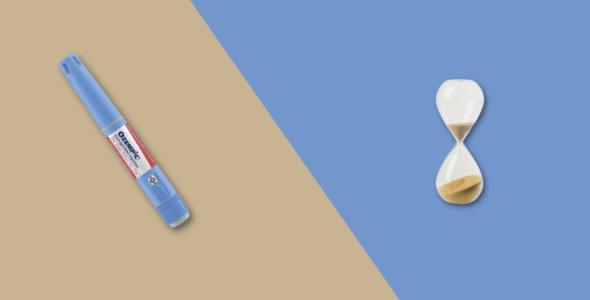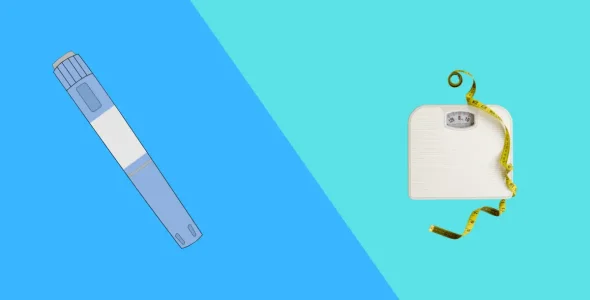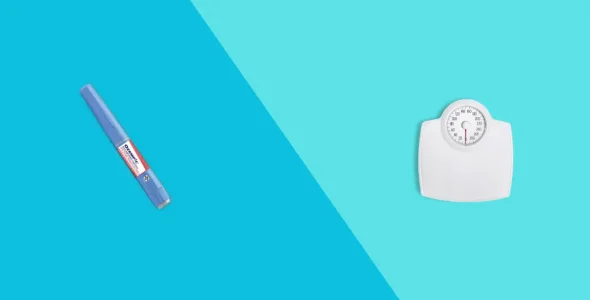Is Ozempic penis real? Get the facts
Social media can’t stop talking about the so-called “Ozempic penis.” But before you believe the hype, let’s look at what’s actually happening inside the body and why science tells a very different story.
Key highlights
- Some Redditors call it the “Ozempic penis,” claiming their penis grew up to 1.5 inches.
- Experts say this is not an actual side effect of GLP-1 drugs. Instead, losing fat above the penis makes more of it visible, and better blood flow from improved metabolic health may also help.
- Some men report erectile issues while on GLP-1 medications, but causality is unproven.
- Extra pubic fat can hide part of the penis, and reducing it can create the illusion of growth.
- Improved confidence and body image after weight loss can affect perception of size and sexual performance.
- Any sudden or persistent changes in erectile function should be discussed with a healthcare provider.
If you’ve browsed forums like Reddit’s r/Ozempic, you might have seen talk of the “Ozempic penis.” Some men taking semaglutide (Ozempic, Wegovy) or other GLP-1 drugs like tirzepatide (Mounjaro, Zepbound) and liraglutide (Saxenda, Victoza) report that their penis seems bigger.
Although it sounds like an online rumor, more and more users are reporting the same experiences.
GLP-1 drugs do not physically grow genital tissue. Any changes in appearance are due to fat loss around the pubic area and improvements in blood flow or hormonal health, not actual tissue growth.
While the meme is exaggerated, it highlights an important point: weight loss can improve men’s sexual function, confidence, and overall well-being.
Viral posts claim Ozempic makes the penis bigger. Here’s what science really says about weight loss, size, and sexual function on GLP-1 drugs.
What people mean by “Ozempic penis”
“Ozempic penis” isn’t an official medical term, but some people on social media (TikTok) use it to describe their penis appearing larger after taking Ozempic.
According to a New York Post, recent Reddit threads, and news coverage show that some men report that their penis appears larger after starting GLP-1 medications like Ozempic, Wegovy, or tirzepatide. These discussions often occur in forums and anecdotal threads, generating viral attention.
While these reports are widely shared online, clinical evidence does not support the claim that GLP-1 medications like Ozempic cause actual penile tissue growth.
Medical experts attribute perceived increases in penis size to factors such as fat loss around the pubic area, which can make more of the penis visible, and improved erectile function due to better metabolic health.
Two main phenomena likely explain these observations:
- Apparent length increase: Fat loss around the pubic area can reveal more of the penis, uncovering what doctors call a “buried penis.” This makes the shaft appear longer even though the organ itself hasn’t grown.
- Improved erection quality: Weight loss and better metabolic health can enhance blood flow, leading to firmer erections. This can make the penis look larger or fuller during arousal, contributing to the perception of growth.
Why Ozempic can appear to make the penis larger – the medical explanation
Extra fat in the lower belly can make the penis look shorter because it hides part of the shaft. As men age or gain weight, fat can build up around the pubic area, and when they lose weight, more of the penis becomes visible.
Your penis usually stops growing after puberty, around age 19 or 20, though this can vary. After that, it’s unlikely to get any longer.
For most people, the size you have is perfectly normal. Studies show 85% of women are satisfied with their partner’s penis size, and only 21% think length is important for sexual satisfaction.
In some men, excess fat and loose skin can build up in the suprapubic area, the fat pad just above the penis. This can cause a “buried penis,” where part of the shaft is hidden beneath the surrounding tissue. The penis itself isn’t shorter; it’s simply concealed by the fat around it.
If this condition is due to being overweight or obese, doctors usually suggest losing weight first, as it can reduce fat around the penis and make more of it visible.
Weight loss can also improve blood flow, which may lead to stronger erections and make the penis appear thicker. However, Ozempic itself doesn’t directly increase penis length or girth.
The illusion of growth
When someone loses a significant amount of weight, especially around the lower belly, the fat pad shrinks, revealing more of the penis’s base. The shaft becomes more visible, so it looks longer even though the actual size hasn’t changed. Urologists often describe this as a common and expected effect after major weight loss, whether from bariatric surgery, lifestyle changes, or GLP-1 medications like Ozempic.
The vascular and physiological effects
Weight loss also improves cardiovascular and endothelial health, leading to better blood flow throughout the body, including to the penis. Improved circulation can enhance erections, making the penis appear fuller or thicker during arousal.
Studies show that losing just 10% of body weight can improve erectile function in men who are overweight or obese. A 2022 study found that this improvement may come from better blood flow, reduced inflammation, improved mental health, and higher testosterone levels.
The psychological effects
Weight loss can boost self-confidence, body image, and sexual self-esteem, which further influences how men perceive their size and sexual performance. This combination of physical visibility, vascular improvement, and psychological uplift creates the appearance of growth, but it’s a visual and functional effect, not an anatomical one.
Size isn’t determined by diet
Penis size is mostly set by genetics and naturally finishes developing by the end of puberty. After this point, no diet, exercise, or weight loss method can make it grow longer. While losing weight can improve appearance and erectile quality, it doesn’t change the actual length or structure of the penis.
If your penis looks longer after starting Ozempic, it’s usually a good sign, not a problem. This is likely due to fat loss around the pubic area, which uncovers more of the penis.
However, you should see a doctor if you notice any of the following:
- A new lump or firmness in the testicles could signal testicular cancer.
- Sudden shrinkage or softening of the testicles may indicate low testosterone or a varicocele.
- Curvature of the penis or painful erections, which could point to Peyronie’s disease.
- Ongoing trouble getting or keeping an erection. Erectile dysfunction has many causes, and a doctor can help you find the best treatment.
Is there any biological mechanism by which semaglutide could actually grow penile tissue?
No, Ozempic doesn’t physically make your penis bigger. But it can look larger because losing fat around the belly can reveal more of the penis, making it appear longer.
There’s no biological mechanism by which semaglutide (Ozempic) can grow penile tissue. Growing new tissue would require local anabolic signals or hormonal changes like sustained increases in testosterone or growth-factor activity, but semaglutide does not trigger these processes in a way that could create new penile tissue.
Sexual benefits of GLP-1 therapy
The perceived “growth” from GLP-1 therapy is usually in sexual performance and desire, driven by improved cardiometabolic health rather than actual tissue growth.
An observational study suggests that a small number of men on semaglutide or other GLP-1 drugs report erectile dysfunction. While this study suggests an association, it does not establish causation, and further scientific evidence is needed to confirm these findings.
On the other hand, losing weight and improving overall metabolic health can significantly enhance erectile function in many men, especially those who are overweight or obese. Excess body fat is linked to poor circulation, hormonal imbalances (lower testosterone), and inflammation, all of which can impair erections.
By shedding weight, blood flow to the penis improves, testosterone levels may rise, and inflammation decreases, leading to stronger, more reliable erections. Studies consistently show that even moderate weight loss, around 10% of body weight, can have meaningful benefits for sexual performance and overall sexual health.
Possible mechanisms hypothesized by researchers:
- Indirect effects: Rapid weight loss, hormonal changes, or shifts in testosterone levels can affect erections.
- Gastrointestinal side effects: Nausea or reduced appetite might temporarily lower libido or sexual performance.
- Rare vascular or neurologic effects: Some theorize uncommon effects on blood vessels or nerves, but this is not proven.
If you notice new or worsening ED after starting semaglutide, get evaluated by a healthcare provider. Don’t assume it’s only the drug, or ignore the issue. Proper assessment can help identify underlying causes and treatment options.
Boosted testosterone levels
Excess body fat, especially around the belly, contains an enzyme called aromatase that converts testosterone into estrogen. This can lower both total and free testosterone levels, reducing libido, energy, and muscle maintenance.
GLP-1 medications help reduce body fat, which lowers aromatase activity and allows testosterone levels to rebound naturally. Studies show that obese or diabetic men experience significant increases in total testosterone after GLP-1 therapy.
Higher testosterone can lead to improved libido, better energy, and stronger muscle maintenance, contributing to overall sexual and physical health.
A 2024 review found that losing weight can raise testosterone levels in men who are overweight or obese. Since testosterone affects sex drive and erections, higher levels can make your erections feel stronger and fuller, even though your penis hasn’t actually grown.
Improved erectile function (ED)
Obesity and type 2 diabetes can damage blood vessels and reduce blood flow, which is a major cause of erectile dysfunction.
GLP-1 medications help control blood sugar and reduce inflammation, which improves cardiovascular and endothelial health, supporting stronger blood flow to the penis.
Many Ozempic users, especially those with type 2 diabetes, experience better erectile function and may notice improved perceived girth due to enhanced blood flow.
How to tell whether your experience is a perceived size change, improved erections, or an adverse effect
Measure consistently:
- Use a rigid ruler and measure from the pubic bone to the tip of the penis along the top.
- Measure both flaccid and erect length under similar conditions each time.
Track your timeline:
- Record when you started the medication.
- Note your weight loss progress and any sexual changes.
- Keep track of dose adjustments and other medications.
Watch for red flags:
Seek medical attention if you notice:
- Sudden loss of function or numbness
- Penile pain
- Erectile dysfunction that doesn’t improve despite general health improvements
Document everything for your clinician:
- Dates, medication doses, weight changes, and any sexual symptoms
- This helps your healthcare provider understand patterns and make informed recommendations
This approach helps distinguish between perceived size changes from fat loss, improved erections from better vascular health, and potential adverse effects.
What to do if you notice sexual changes while on Ozempic
Do not stop Ozempic on your own. Your doctor can help assess whether the medication may be contributing and guide safe next steps.
This step-by-step approach ensures sexual changes are addressed safely, whether they are related to Ozempic or other health factors.
- Don’t panic: Many people notice changes in sex drive, performance, or sensitivity as their body adjusts.
- Track what’s happening: Note when you first noticed the change, how long it lasts, and if it’s improving or worsening.
- Talk to your healthcare provider: They can check for other causes (hormone levels, stress, or medications) and decide if your Ozempic dose or timing needs adjusting.
- Focus on overall health: Prioritize good sleep, balanced nutrition, and resistance training, all of which help hormone balance and sexual health.
- Be patient: Some side effects fade as your body adapts to weight loss and metabolic changes.
- Check for other causes: High testosterone and thyroid levels.
- Look at mental health: Depression, anxiety, or stress can all play a role.
- Lifestyle interventions: Exercise regularly, get adequate sleep, and manage stress.
If erectile dysfunction continues, a urologist or sexual-medicine specialist can provide targeted evaluation and treatment.
Common myths
1. Ozempic can make your penis grow
- Myth: Some believe Ozempic directly increases penile length or girth.
- Fact: Any perceived increase is due to fat loss around the pubic area and improved erections, not actual tissue growth.
2. Weight loss doesn’t affect sexual function
- Myth: Losing weight has no impact on erections or libido.
- Fact: Weight loss improves blood flow, testosterone levels, and overall metabolic health, which can enhance sexual function.
3. Erectile dysfunction while on Ozempic is common
- Myth: ED is a frequent side effect of Ozempic.
- Fact: ED reports are rare (<2% in studies) and may be influenced by other health factors.
4. Diet or exercise can change penis size
- Myth: Eating certain foods or exercising a certain way can make the penis longer.
- Fact: Penis size is genetically determined and fixed after puberty; lifestyle changes only improve appearance or erectile quality.
5. If the penis looks bigger, it means growth
- Myth: Seeing a longer penis after Ozempic means it grew.
- Fact: This is usually the “uncovering” of a buried penis due to fat loss, combined with better blood flow during erections.
Is erectile dysfunction a possible side effect of Ozempic?
There’s no solid proof that Ozempic directly causes erectile dysfunction. A few men have reported problems with erections while using it, but this may be linked to other factors like rapid weight loss, hormonal changes, or existing health issues.
Some people on Reddit say they experienced erectile problems while using Ozempic, but there’s no clear proof that the drug directly causes ED.
Research on Ozempic and erectile function is still limited, but early reports show it can rarely cause erectile dysfunction.
In one study, people without diabetes who took semaglutide (the active ingredient in Ozempic and Wegovy) were slightly more likely to be diagnosed with ED than those taking a placebo. Overall, ED remained uncommon, affecting less than 2% of participants.
If you notice any changes in your erections, it’s best to talk to your doctor. They can check for other possible causes and suggest effective treatments. Erectile issues can happen at any age and are often treatable.
Frequently asked questions
Can Ozempic actually increase penis length?
There’s no evidence that Ozempic increases penis length or causes tissue growth. Any perceived increase is typically due to fat loss in the pubic area, which makes more of the shaft visible rather than actually enlarging it.
Could Ozempic cause erectile dysfunction?
Some men have reported erectile issues while using Ozempic, but research hasn’t confirmed a direct cause. Factors like rapid weight loss, hormonal shifts, or underlying health conditions may play a role. It’s best to discuss any changes with your clinician.
Should I stop Ozempic if I notice sexual problems?
Don’t stop Ozempic on your own if you experience sexual side effects. Speak with your prescriber, who can help determine whether the issue is medication-related or due to other factors, and guide you on safe next steps or possible adjustments.
Does weight loss always improve erections?
Weight loss often improves erectile function by enhancing blood flow, hormone balance, and cardiovascular health. However, the degree of improvement varies. Some men notice significant changes, while others see little difference, depending on age, health, and underlying conditions.
How can I measure whether the size changed?
To track any change, measure from the pubic bone to the tip of the penis along the top using a rigid ruler. Take measurements flaccid and fully erect, under similar conditions and temperature, to ensure consistency over time.
When should I see a specialist?
See a specialist if erectile problems are sudden, persistent, painful, or don’t improve after lifestyle changes or medication review. A urologist or sexual-medicine expert can assess underlying causes and recommend targeted treatment.
Risks and warnings
ED risk in non-diabetic men
While the overall risk is low, research suggests a slightly higher chance of new erectile dysfunction (around 1.5%) in men taking GLP-1 medications like Ozempic for weight loss without a diabetes diagnosis. Caution and monitoring are advised.
The nausea and libido link
Ozempic commonly causes gastrointestinal side effects such as nausea, vomiting, and loss of appetite, especially during the first few weeks of treatment or after dose increases. These effects can lead to temporary reductions in sexual desire or libido, simply because feeling unwell or low on energy makes sexual activity less appealing.
Additionally, reduced food intake and overall caloric deficit may lower energy levels and mood, which can further contribute to a short-term drop in sexual interest.
While these effects are usually temporary and improve as the body adjusts to the medication, it’s important to monitor changes and discuss persistent issues with a healthcare provider for medical advice.
The body image crisis
Rapid weight loss from Ozempic can lead to unexpected changes in appearance that affect self-perception. Some users report loss of facial volume, often referred to as “Ozempic Face,” as well as changes in body shape that may feel unfamiliar or disproportionate.
Another term is “Ozempic feet”, an informal phrase some people use online to describe changes in their feet after significant weight loss with Ozempic (semaglutide). Rapid weight loss can reduce the natural fat cushion on the soles of your feet, making them feel bonier, more sensitive, or sore when walking.
Even though these changes are a sign of fat loss and improved health, they can negatively impact confidence and body image, especially if someone is not prepared for how quickly their appearance may shift.
This psychological impact can, in turn, influence sexual confidence and desire. Men who feel self-conscious about these changes may notice a temporary drop in libido or sexual enjoyment, even while their overall health, wellness, and sexual function may be improving.
Support from healthcare providers, realistic expectations, and focusing on overall health rather than purely appearance can help mitigate these effects.
Conclusion
Your penis can appear shorter when it’s surrounded by excess fat. Fat in the pubic area can hide the base of the penis, a condition known as buried penis. Losing weight is often recommended to reveal more of the shaft and improve appearance.
Losing weight with Ozempic or other methods can reduce pubic fat, making your penis appear longer and fuller. You may also experience stronger erections, as weight loss is linked to improved erectile function, particularly over time.
The “Ozempic penis” meme may be humorous, but it highlights a real medical fact: significant weight loss can profoundly improve men’s hormonal and sexual health. The real benefits aren’t about inches. They come from higher testosterone, better blood flow, and increased confidence.
Your penis stops growing after puberty. However, any unusual changes, such as a new bend, sudden firmness, or unexpected shrinkage of the penis or testicles, should be evaluated by a healthcare provider.






